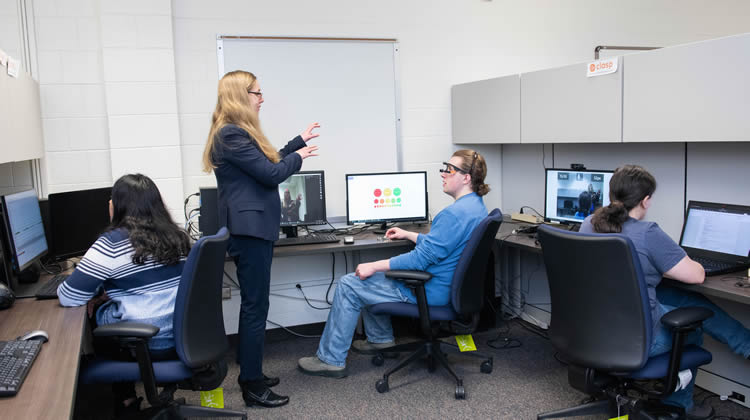Engineering Psychology Advanced Certificate

Engineering Psychology
Advanced Certificate
- RIT /
- College of Liberal Arts /
- Academics /
- Engineering Psychology Adv. Cert.
Explore human-machine interaction, cognition, and ergonomics to improve design and user experience.
Overview for Engineering Psychology Adv. Cert.
Engineering psychology focuses on exploring and understanding the relationship between humans and machines. It’s the science of human behavior and our interactions with the technologies that go into the design and operation of machines, equipment, and more.
An Innovative Engineering Psychology Program
The advanced certificate in engineering psychology will expand your core knowledge of engineering psychology by exploring course work in cognition, perception, ergonomics, industrial design, and more. The advanced certificate provides you with formal recognition of your knowledge in engineering psychology and establishes a credential for seeking a career in the human factors or ergonomics fields. Students enrolled in the MS degree in experimental psychology may be awarded the advanced certificate by taking the certificate's required courses as part of their master's program.
What is a Graduate Certificate?
A graduate certificate, also called an advanced certificate, is a selection of up to five graduate-level courses in a particular area of study. It can serve as a stand-alone credential that provides expertise in a specific topic that enhances your professional knowledge base, or it can serve as the entry point to a master's degree. Some students complete an advanced certificate and apply those credit hours later toward a master's degree.
Curriculum for 2025-2026 for Engineering Psychology Adv. Cert.
Current Students: See Curriculum Requirements
Admissions and Financial Aid
This program is available on-campus only.
| Offered | Admit Term(s) | Application Deadline | STEM Designated |
|---|---|---|---|
| Part‑time | Fall, Spring, or Summer | Rolling | No |
Part-time study is 1‑8 semester credit hours. RIT will not issue a student visa for advanced certificates.
Application Details
To be considered for admission to the Engineering Psychology Adv. Cert. program, candidates must fulfill the following requirements:
- Complete an online graduate application.
- Submit copies of official transcript(s) (in English) of all previously completed undergraduate and graduate course work, including any transfer credit earned.
- Hold a baccalaureate degree (or US equivalent) from an accredited university or college. A minimum cumulative GPA of 3.0 (or equivalent) is recommended.
- Submit a current resume or curriculum vitae.
- Submit a personal statement of educational objectives.
- Letters of recommendation are optional.
- Entrance exam requirements: None
- Submit English language test scores (TOEFL, IELTS, PTE Academic, etc.), if required. Details are below.
English Language Test Scores
International applicants whose native language is not English must submit one of the following official English language test scores. Some international applicants may be considered for an English test requirement waiver.
Duolingo (DET): 120
IELTS: 6.5
LanguageCert Academic: 70
PTE Academic: 56
TOEFL: 79/4.5
International students below the minimum requirement may be considered for conditional admission. Deaf and hard-of-hearing test takers with significant hearing loss do not need to take the listening and speaking sections for the TOEFL and IELTS. Each program requires balanced sub-scores when determining an applicant’s need for additional English language courses.
How to Apply Start or Manage Your Application
Cost and Financial Aid
An RIT graduate degree is an investment with lifelong returns. Graduate tuition varies by degree, the number of credits taken per semester, and delivery method. View the general cost of attendance or estimate the cost of your graduate degree.
A combination of sources can help fund your graduate degree. Learn how to fund your degree
Accreditation
Contact
- Delaney Ball
- Assistant Director
- Graduate Admissions
- Enrollment Management
- 585‑475‑6933
- Delaney.Ball@rit.edu
- Esa Rantanen
- Associate Professor, Psychology
- Department of Psychology
- College of Liberal Arts
- 585‑475‑4412
- emrgsh@rit.edu
Department of Psychology









